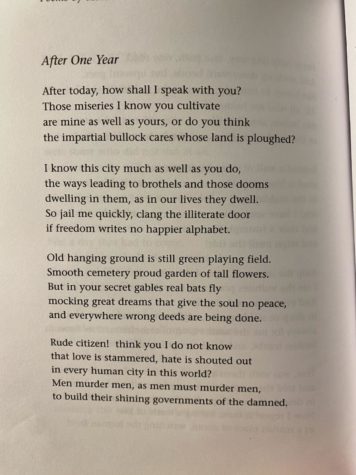Reed Books: After One Year
April 18, 2021
In Martin Carter’s poem “After One Year”, published in the 1960s, he accuses his readers, almost personally, of refusing to let the British colony of Guiana change for the better. In his previous poems, Carter had largely been optimistic and inspired, but by “After One Year”, this naivete had hardened into bitterness.

He addresses his audience directly, through “you” and different rhetorical questions, even calling them a “rude citizen” halfway through. Carter’s frustration is refined to a single object, if not a specifically named one. He no longer believes that he can radicalize this colony on a large scale, so he scales down the audience to a singular, symbolic “you”. This “you” is not someone whom Carter believes will work with him, either. He suggests that the reader throws him in prison, because he believes this is something that this hypothetical reader would want to do. Prior to this poem, Carter had been arrested twice and thrown out of the People’s Progressive Party, so no wonder he sees the general public as the enemy.
But is this bitterness a positive or a negative?
On one hand, Carter’s frustration is a motivator. He writes scathing and poignant poems about a lack of change, none of which are actually wrong. He calls the audience to action by insulting them, as his previous method of inspiration drew him a blank.
However, cynicism goes bad quickly. Carter limits himself later in life to primarily emotional, apolitical poetry, which is probably wise. He may not have caught many flies with honey, but he was catching even less with vinegar.
Overall, “After One Year” is a motivating, but somewhat sad, look into Carter’s own life in the 1960s. He seems to win his inspiration back as time goes on, but this level of frustration never truly leaves him.













































